九年级英语上册第四课知识点整理
(最新)人教版初中英语:九年级上册 Unit 4 课文重点语法

Unit4 知识梳理Unit4 I used to be afraid of the dark.【重点短语】ed to do 过去常常做2.deal with 对付应付3.b e proud of 为…… 骄傲,感到自豪4.t ake pride in 为…… 感到自豪5.from time to time 时常,有时6.in public 公开地7.i n person 亲身,亲自8.t ake up sth 开始做,接受,占用9.not……anymore 不再10.worry about 为…… 担忧11.hang out 闲逛12.think about 考虑13.be alone 独处14.on the soccer team 在足球队15.no longer 不再16.make a decision 做决定17.to one’s surprise 令某人吃惊的是18.even though 尽管19.pay attention to 对…… 注意,留心20.in the last few years 在过去的几年里21.be afraid of 害怕22.turn red 变红23.tons of attention 很多关注24.be careful 当心25.give up 放弃26.a very small number of … 极少数的……27.give a speech 作演讲28.all the time 一直总是29.be interested in 对…… 感兴趣30.change one’s life 改变某人的生活31.take care of 照顾32.one of…, …… 之一【重点句型】1. I used to be afraid of the dark.我过去常常前害怕黑暗.2.I go to sleep with my bedroom light on.我开着卧室的灯睡觉.3.I used to spend a lot of time playing games with my friends.以前我常常花很多时间和我的朋友们玩游戏.4.I hardly ever have time for concerts.我几乎没有时间去听音乐会.5.My life has changed a lot in the last few years.我的生活在过去几年里改变了很多.6.It will make you stressed out.那会使你紧张的.7.It seems that Yu Mei has changed a lot.玉梅似乎变化很大.03词汇精讲1.silentsilent 是形容词,意为“沉默的;无言的”,其名词形式为silence。
牛津译林版英语九年级上册第四单元分课时词组

九年级英语9A Unit4词组总结COMIC1.你在想啥呢?What’s on your mind?2.挂在心上,惦念on one’s mind3.我很忧虑,长大真难。
I’m worried . Growing up is hard4.从我第一次见到你,你就一直很开心。
You’ve been happy since I first met you.5.我现在太大了,我的房子都装不下我了。
I’m ( growing ) too big for my house.I’m ( growing ) too big to live in my house. (too---to---) 6.再给自己建一个build another one for yourself(build sb sth=build sth for sb)7.那不容易。
That won’t be easy.8.把房子建完再叫醒我。
Don’t wake me up until you finish building it.直到----才----not ---until 做完---finish ( doing)9.帮你学习并成长help you learn and grow10.分享他们所学到的share what they have learnt11.做关于---的调查do a survey on sth / how to do sth /12.了解世界learn about the world13.从书上了解--- learn from books14.用这种方式学习learn that way15.让某人做某事allow sb do sth16.不同时代和不同地域的人们people in different times and places17.任何时候想读就读。
I can read books whenever I want to.I can read books at any time I want to.--- (不论何时何地at any time and any place 或whenever and whereever)18.通过因特网了解某事learn through the Internet19.快而且容易quick and easy20.大量的信息 a great deal of informationa great dealof = a lot of, 处理,对付deal with (deal 动词dealt,dealt)21.一----就--- as soon as (主将从现)READING1.永不言弃never give up2.读一篇关于---的文章read an article about3.NBA最矮的球员the shortest player in the NBA4.出生于be born in (地点)in / on (时间)5.天生be born with---6.非常矮小very small 其他如very , too , quite , a little , a bit , enough , how ,what (a , an )等7.比---小的多了much smaller 其他如even , a little / bit , a lot=much , far , a great deal 等a little=a bit +原级/ 比较级a little =a bit of +不可数名词8.学校其他孩子the other kids at school9.学校其他任意一个孩子any other kid at school10.学校里其他任意一个人anyone at school11.就读初中期间while attending junior high / during junior high / in junior high12.参加校队的选拔try out for sth13.拒绝某人refuse sb14.拒绝做某事refuse to do sth15.被拒绝做某事be refused to do sth16.refuse sb sth She can’t refuse him anything. 她什么也不能拒绝他。
九年级英语上册Unit1 第4课时Grammar教学课件新版牛津版

B1Amy is writing about what her family does at the weekend. Help her complete the sentences with the correct conjunctions.
3. _E_it_h_e_r_/_N_o_t_o_n_l_y_ my mum _o_r_/b_u_t__(a_l_s_o_) my dad does the dishes after lunch. I also help with it.
4. In the afternoon, my grandpa and my dad _e_i_th__er_/_n_o_t_o_n_l_y_ play chess _o_r/_b_u_t_(_a_l_so_)_ chat with each other.
(also) ..., either ... or ... and neither ... nor ...
both ... and ...、not only ... but (also) ...、 either ... or ... 和neither ... nor ...都是常见 的并列连词,它们可以连接两个并列的主 语、谓语、宾语、表语、状语等。 both ... and ...意思是“......和......两者都; 既......又......”。
with my family in Beijing. 2. The classrooms are clean _a_n_d_ bright. 3. Sometimes I feel hungry between meals,
_s_o_ I eat an apple or a pear.
牛津译林版九年级英语上册Unit 4 Grammar 示范课教案

4. Students compare the sentences and learn.
6. Students read and complete the sentences.
7. Students read and circle the conjunctions.
环节三:巩固新知,完成练习,在此基础进行迁移创新。(16 mins)
教师引导学生完成练习,巩固对时间状语从句相关知识的用法,并联系实际,进行想象和创造活动。
教学活动
13. Students read and complete the sentences.
14. Students read the article written by David about Yaoming and complete the article with the correct conjunctions.
二、学情分析
通过前几课时的学习,学生已经掌握了如何描述个人经历,但对如何用时间状语从句来描述事件的发生存在一定的困难。学生在前几册的教材中接触过时间状语从句,对其中使用的连词并不陌生,但如何有意识地运用这些连词还需要一定的指导。
三、教学目标
通过本课时的学习,学生能够:
1.感知并总结时间状语从句的构成规则。
2.在语境中识别时间状语从句的意义与功能,并总结、归纳其句型结构。
3.运用时间状语从句来描述个人经历。
四、教学重难点
【重点】
1.感知并总结时间状语从句的构成规则。
2.在语境中识别时间状语从句的意义与功能,并总结、归纳其句型结构。
【难点】
运用时间状语从句来描述个人经历。
冀教版英语九年级上册Unit3第4课时教案与反思2022

第四课时Lesson 16: How Safe Is Your Home? 满招损,谦受益。
《尚书》原创不容易,【关注】,不迷路!重点单词certain adj.某些;某个themselves pron.反身代词salt n.食盐scissors n.剪刀knife n.刀heat n.高温;热;炉灶v.加热burn v.(burned/burned或burnt/burnt)烧伤;烫伤;燃烧slip v.滑倒重点短语put out 扑灭baking soda 小苏打重点句子1.Can people prevent certain accidents?人们能阻止某些事故吗?2.Many people hurt themselves by falling off chairs. 很多人从椅子上掉下来而伤着自己。
3.Don’t use water to put out kitchen fires. 不要用水去扑灭厨房的火。
e baking soda or salt instead!用小苏打或者盐代替。
5.Be careful with your knives. 小心你的刀。
6.Be sure to keep the bathroomfloor dry after you have a shower orbath. 当你洗澡后确保浴室的地板是干的。
教学难学会祈使句的用法点环节1 新课导入T:Boys and girls,please answer my questions.What place makes you feel the most comfortable?Ss:My home.T:Yes.Do you think your home is a safe place?Ss:Yes.T:Think again!In fact there are many accidents happening in people’s homes.Now let’s learn Lesson16 to know about them.Are you ready?设计意图:此环节通过师生间的对话导入本课的话题“在家是否安全”,预热本课的词汇和句型,为下面课文的学习做好铺垫。
九年级上册英语4课知识点

九年级上册英语4课知识点Unit 4: The Memory of Water本单元主要介绍了水的重要性以及与水相关的知识。
以下是九年级上册英语第四课的主要知识点:1. Vocabulary (词汇)本单元的词汇主要集中在与水和环境相关的主题上。
例如:waterfall(瀑布)、drought(干旱)、preserve(保护)、conserve (节约)等。
对于这些词汇,学生需要了解其基本意思以及如何在句子中正确运用。
2. Expressing abilities (表达能力)本单元中,学生将学习到如何表达个人的能力。
例如:can、be able to等。
学生需要学会正确运用这些表达,以描述自己或他人的能力。
3. Giving advice (给建议)学生将学习如何给予他人建议。
例如:should、ought to等。
他们需要了解这些表达的用法,并在适当的场合给出建议。
4. Grammar (语法)本单元的语法重点是被动语态。
学生需要学会如何将动作的承受者放在句子的主语位置,而将动作的执行者放在句子的宾语位置。
例如:The lake was polluted by factories. (这个湖被工厂污染了。
)5. Reading comprehension (阅读理解)本单元的阅读理解将涉及关于水的文章,学生需要读懂文章并回答与文章内容相关的问题。
同时,他们需要学会从文章中提取关键信息,以达到有效的阅读理解。
6. Listening skills (听力技巧)学生将通过听取与水相关的对话和短文来发展听力技巧。
他们需要听懂所听材料,并回答与之相关的问题。
7. Writing (写作)本单元的写作任务主要是写一篇关于环保的文章。
学生需要用所学的知识和词汇描述环境问题,并提出自己的观点和建议。
通过学习本单元的知识点,学生将能够更好地理解和运用与水相关的英语词汇和表达方式。
他们将能够对环境问题有更深入的认识,并提出自己的观点和建议,为环保事业做出贡献。
冀教版英语九年级上册Unit1第4课时教案与反思2022

第四课时 Lesson 4: Don’t smoke, Please! 满招损,谦受益。
《尚书》原创不容易,【关注】,不迷路!重点单词smoke v.吸烟n.烟harmful adj.(尤指对健康或环境)有害的;导致损害的breathe v.呼吸public adj.公共的;大众的law n.法律;法规whenever conj.在任何……的时候;无论何时risk n.危险;风险somebody pron.有人;某人重点短语millions of 成千上万的;无数的as a result of 因此;由于second-hand smoke 二手烟take a risk 冒险get into the habit of 养成……的习惯;沾染上……的习气stay away from 躲避;离……远点重点句子1.Smoking is bad for your health. 吸烟有害健康2.Every year,millions of people around the world die as a result of smoking. 每年有成千上万的人死于吸烟。
3.Don’t take that risk. 别冒那个险。
4.If your family members smoke,encourage them to stop smoking. 如果你的家人吸烟,鼓励他们戒烟。
5.Once you get into the habit ofsmoking,it’s not easy to give it up.你一旦染上吸烟的习惯,就很难戒掉。
掌握情态动词should的用法。
教学难点环节1 新课导入T:Do you know when the World No Tobacco Day is?Ss:Yes,I do.The World No Tobacco Day is April 4.T:Do people in your family smoke?Ss:Yes.My fther smokes.T:What do you advise him to do?Ss:I advise him to give up smoking.T:En...I think you have already known that smoking is harmful for our health.Yes,smoking is not only harmful for our health,but also harmful for the environment,so we sould stay away from smoking.Now,let’s look at our text book “Don’t Smoke,Please!”设计意图:明确本课的教学内容,引导学生进入本课的话题。
人教版(浙江专用)九年级英语上册课件:Unit 6 第四课
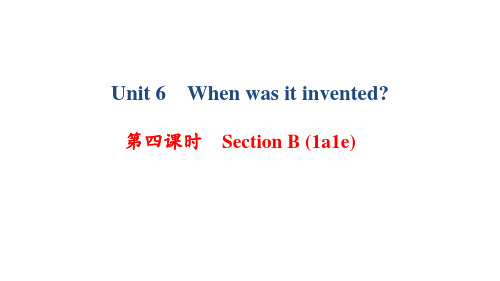
二、语法填空。 Do you know that potato chips were invented 6. by mistake?Here on the book it says 7. that they were invented by a chef 8. called(call) George Crum.It was back in 1853.One day a customer in the restaurant where George worked sent back his plate of fried potatoes because he said they 9. were cut (cut) too thick.Then George was in a bad mood,10. so he cut the potatoes really,really thin,and he 11. cooked (cook) them for a long time until they were crispy.
③by the end of意为“在……以前,到……为止”,常与将来时态或过去完 成时态连用。
eg:By the end of last month,we had learnt over ten English songs.到上个月 底为止,我们已经学会了十多首英文歌曲。
►salty enough足够咸的 enough作形容词,意为“足够的;充分的”,后接名词;作副词,意为 “足够地;充分地”,总放在被修饰的副词或形容词之后。 eg:I have enough food to eat.我有足够的食物吃。(修饰名词) The book is easy enough for your children to read.这本书很容易,你的孩子们 读得懂。(修饰形容词) They can't walk fast enough,so they'll miss the early bus.他们走得不够快,所 以他们将会错过早班公交车。(修饰副词)
九年级上册Unit 4知识点
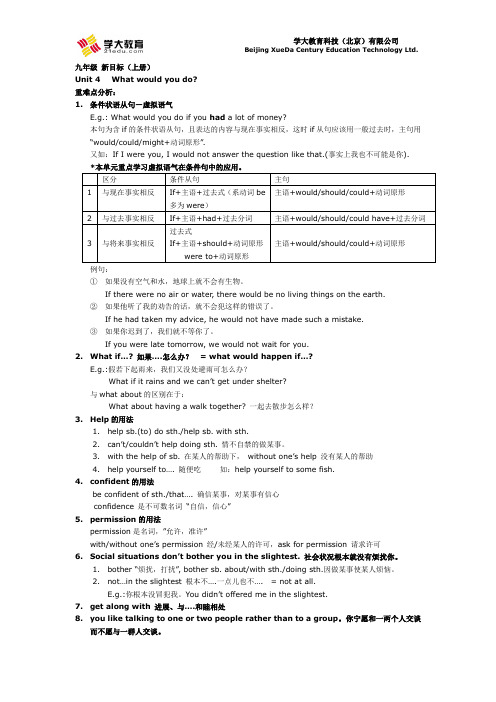
九年级新目标(上册)Unit 4 What would you do?重难点分析:1.条件状语从句—虚拟语气E.g.: What would you do if you had a lot of money?本句为含if的条件状语从句,且表达的内容与现在事实相反,这时if从句应该用一般过去时,主句用“would/could/might+动词原形”.又如:If I were you, I would not answer the question like that.(事实上我也不可能是你).*本单元重点学习虚拟语气在条件句中的应用。
区分条件从句主句1 与现在事实相反If+主语+过去式(系动词be多为were)主语+would/should/could+动词原形2 与过去事实相反If+主语+had+过去分词主语+would/should/could have+过去分词3 与将来事实相反过去式If+主语+should+动词原形were to+动词原形主语+would/should/could+动词原形例句:①如果没有空气和水,地球上就不会有生物。
If there were no air or water, there would be no living things on the earth.②如果他听了我的劝告的话,就不会犯这样的错误了。
If he had taken my advice, he would not have made such a mistake.③如果你迟到了,我们就不等你了。
If you were late tomorrow, we would not wait for you.2.What if…? 如果….怎么办?= what would happen if…?E.g.:假若下起雨来,我们又没处避雨可怎么办?What if it rains and we can’t get under shelter?与what about的区别在于:What about having a walk together? 一起去散步怎么样?3.Help的用法1.help sb.(to) do sth./help sb. with sth.2.can’t/couldn’t help doing sth. 情不自禁的做某事。
牛津上海版英语九年级上册《Unit 4 Computers》说课稿2

牛津上海版英语九年级上册《Unit 4 Computers》说课稿2一. 教材分析《Unit 4 Computers》是牛津上海版英语九年级上册的一单元。
本单元的主题是计算机,主要围绕计算机的历史、功能、用途等方面展开。
通过本单元的学习,学生能够了解计算机的发展历程,掌握计算机的基本功能,以及运用计算机解决实际问题的能力。
本单元的主要内容包括:1. 计算机的发展历程;2. 计算机的基本功能;3. 计算机在日常生活中的应用;4. 计算机的未来发展。
二. 学情分析九年级的学生已经具备了一定的计算机基础,对计算机有一定的了解。
但他们对计算机的历史和发展过程可能了解不多,对计算机在未来社会的发展趋势也缺乏深入的认识。
因此,在教学过程中,需要注重引导学生了解计算机的发展历程,以及对未来发展的思考。
三. 说教学目标1.知识目标:学生能够了解计算机的发展历程,掌握计算机的基本功能,以及运用计算机解决实际问题的能力。
2.能力目标:学生能够运用所学的计算机知识,进行信息的收集、处理和传递。
3.情感目标:培养学生对计算机的兴趣,以及对科学研究的热情。
四. 说教学重难点1.重点:计算机的发展历程,计算机的基本功能。
2.难点:计算机在未来社会的发展趋势,以及如何运用计算机解决实际问题。
五. 说教学方法与手段1.教学方法:采用问题驱动法、案例教学法、小组讨论法等。
2.教学手段:利用多媒体课件、网络资源、实物展示等。
六. 说教学过程1.导入:通过展示计算机的发展历程视频,激发学生的学习兴趣,引入新课。
2.讲解:讲解计算机的发展历程,介绍计算机的基本功能。
3.实践:学生分组进行计算机实际操作,体验计算机的基本功能。
4.讨论:学生分组讨论计算机在日常生活中的应用,以及计算机在未来社会的发展趋势。
5.总结:教师引导学生总结本节课所学内容,进行知识的巩固。
七. 说板书设计板书设计如下:1.计算机的发展历程•计算机的诞生•计算机的发展•计算机的普及2.计算机的基本功能3.计算机在日常生活中的应用4.计算机在未来社会的发展趋势八. 说教学评价教学评价采用过程性评价和终结性评价相结合的方式。
九年级英语上册知识点归纳Unit4(仁爱版英语)

九年级英语上册知识点归纳Unit4(仁爱版英语)九年级英语上册知识点归纳Unit4轮流11.nodoubt无疑地12.asellas除……的之外,也13.forinstance/exaple 例如14.oron做……的工作15.dependon/upon依靠,依赖16.turnon打开17.turnoff关掉18.turnup开大19.turndon 关小20.clicon用鼠标点击21.looforardtodoingsth期待做某事二、重点句型:1.Nobigplansarebeingadetosenduporesatellitesandeven buildaspacestation.现在中国正在计划发射更多的卫星,甚至建造一个空间站。
句子“arebeingade”是现在进行时的被动语态,结构“bebeing+过去分词”。
主动句中的宾补如果是不带to的不定式时,变成被动句后,成为主补的不定式必须带to,常见跟不带to的复合宾语的动词有see、feel、hear、ae等。
2.I’ovedbyhatyangLieidid.我被杨利伟所做的事感动了。
hatyangLieidid是介词by的宾语从句,意为“杨利伟所做的事”beovedby为……而感动如:Thestudentsareovedbytheoldan’sstory.同学们为那位老人的故事而感动。
3.Generallyspeaing,eareingoodhealthno.一般来说,我们现在的健康状况良好。
generallyspeaing“一般来说、大体上、大概”ingood/badhealth处于好的身体状况。
如:Hehasacold,heisalaysinbadhealth.他感冒了,他的身体状况总是不好。
4.ecouldn’thelplooingattheearthagainandagain.我们忍不住再三地看着地球。
can’t/couldn’thelpdoingsth.忍不住做某事,不能停止做某事。
九年级英语上册Unit4 Stories and poems Lesson24 Writing a

九年级英语上册Unit4 Stories and poems Lesson24 Writing a Poem教学设计新版冀教版一. 教材分析冀教版九年级英语上册Unit4 Stories and poems Lesson24 Writing a Poem是一个写作课。
本课的主题是学习写一首诗,通过欣赏和分析不同类型的诗歌,让学生掌握诗歌的基本结构和修辞手法,并能够创作一首属于自己的诗歌。
教材内容丰富,包括不同风格的诗歌示例、诗歌创作技巧指导和学生的创作实践。
二. 学情分析九年级的学生已经具备了一定的英语基础,能够理解和运用一些基本的英语句型和词汇。
然而,诗歌创作对于他们来说可能是一个新的挑战,需要引导学生充分发挥想象力和创造力。
此外,学生可能对诗歌的修辞手法和结构有一定的陌生感,因此需要教师在教学中进行详细的讲解和示范。
三. 教学目标1.能够理解并运用诗歌中的常用词汇和句型。
2.能够欣赏并分析不同类型的诗歌,理解诗歌的基本结构和修辞手法。
3.能够创作一首属于自己的诗歌,展示想象力和创造力。
4.培养对英语诗歌的兴趣和鉴赏能力。
四. 教学重难点1.诗歌中的修辞手法和结构的理解。
2.学生创作诗歌的能力的培养。
五. 教学方法1.任务驱动法:通过设定具体的写作任务,引导学生主动学习和参与。
2.案例分析法:通过分析不同类型的诗歌案例,让学生理解和掌握诗歌的基本结构和修辞手法。
3.互动式教学法:通过教师与学生、学生与学生之间的互动,激发学生的学习兴趣和创造力。
六. 教学准备1.准备不同类型的诗歌案例,包括示例和分析。
2.准备诗歌创作技巧的指导资料。
3.准备写作任务的要求和评价标准。
七. 教学过程1.导入(5分钟)通过展示一首美丽的英文诗歌,引发学生对诗歌的兴趣,并引导学生思考诗歌的特点和魅力。
2.呈现(10分钟)呈现不同的诗歌案例,让学生欣赏和分析。
引导学生关注诗歌的主题、结构、修辞手法等,并通过讨论和分享,让学生表达对诗歌的理解和感受。
人教版初三英语九年级上册Unit4知识点
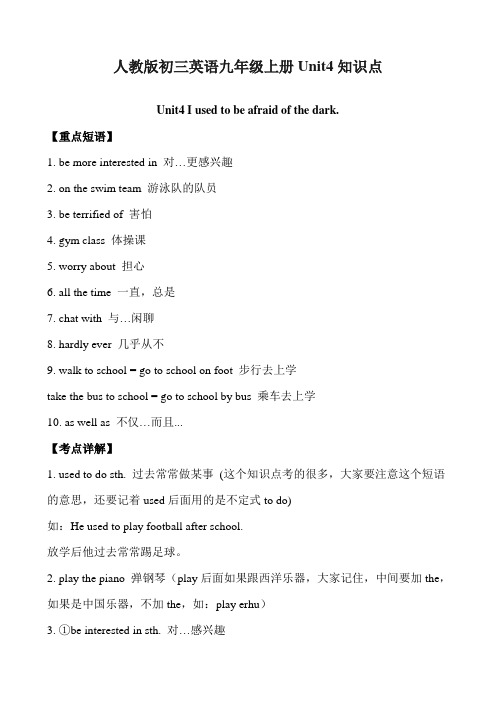
人教版初三英语九年级上册Unit4知识点Unit4 I used to be afraid of the dark.【重点短语】1. be more interested in 对…更感兴趣2. on the swim team 游泳队的队员3. be terrified of 害怕4. gym class 体操课5. worry about 担心6. all the time 一直,总是7. chat with 与…闲聊8. hardly ever 几乎从不9. walk to school = go to school on foot 步行去上学take the bus to school = go to school by bus 乘车去上学10. as well as 不仅…而且...【考点详解】1. used to do sth. 过去常常做某事(这个知识点考的很多,大家要注意这个短语的意思,还要记着used后面用的是不定式to do)如:He used to play football after school.放学后他过去常常踢足球。
2. play the piano 弹钢琴(play后面如果跟西洋乐器,大家记住,中间要加the,如果是中国乐器,不加the,如:play erhu)3. ①be interested in sth. 对…感兴趣②be interested in doing sth. 对做…感兴趣(对于这两个用法大家一定要掌握,切记切记)如:He is interested in math, but he isn't interested in speaking English. 他对数学感兴趣,但是他对说英语不感兴趣。
4. interested adj. 感兴趣的,指人对某事物感兴趣,往往主语是人interesting adj.有趣的,指某事物/某人具有趣味,主语往往是物(对于interested 和interesting要区分清楚,一个主语往往是人,一个主语往往是物)5. be terrified of sth. 害怕……如:I am terrified of the dog.be terrified of doing sth. 害怕做……如:I am terrified of speaking.6. spend 动词,表示“花费金钱、时间”(spend和pay for它们的主语都是人,这一点大家要清楚)①spend…on sth. 在某事上花费(金钱、时间)(重要考点)②spend…(in)doing sth. 花费(金钱、时间)去做某事(重要考点,尤其要注意动名词,也就是动词的ing形式)如:He spends too much time on clothes. 他花费太多的时间在衣着上。
新牛津译林版九年级英语上册教案Unit4第四课时
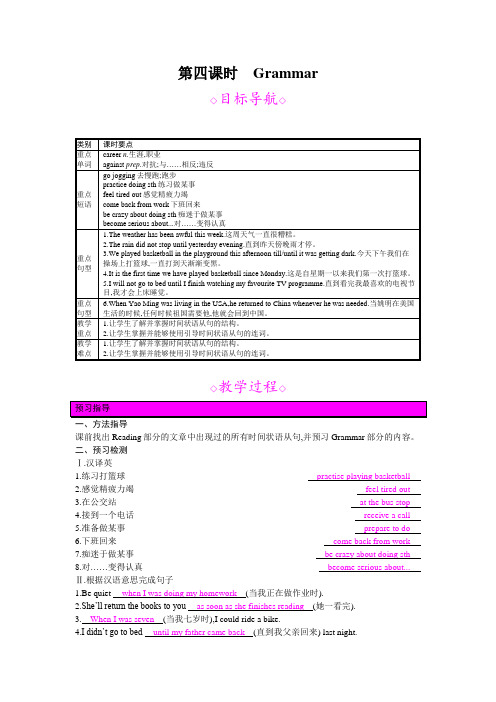
第四课时Grammar◇目标导航◇◇教学过程◇一、方法指导课前找出Reading部分的文章中出现过的所有时间状语从句,并预习Grammar部分的内容。
二、预习检测Ⅰ.汉译英1.练习打篮球practise playing basketball2.感觉精疲力竭feel tired out3.在公交站at the bus stop4.接到一个电话receive a call5.准备做某事prepare to do6.下班回来come back from work7.痴迷于做某事be crazy about doing sth8.对……变得认真become serious about...Ⅱ.根据汉语意思完成句子1.Be quiet when I was doing my homework(当我正在做作业时).2.She’ll return the books to you as soon as she finishes reading(她一看完).3.When I was seven(当我七岁时),I could ride a bike.4.I didn’t go to bed until my father came back(直到我父亲回来) last night.Step1情景导入Teacher:Read the sentences and translate them into Chinese and find out the time clauses.1.You have been happy since I first met you.从我第一次见你开始,你就一直很开心。
2.Don’t wake me up until you finish building it.直到你把它建好才叫醒我。
3.When he finally got the chance,he scored 20 points in his first game.他最终获得了机会,在第一场比赛中获得了20分。
冀教版九年级英语上册 Lesson 4 【精品课件】

· Eat more fruits and vegetables, do more exercise, and form good habits.
Once you get into the habit of smoking, it's not easy to give it up. Stay away from cigarettes and you can live a long, healthy and happy life.
知识点 2 harmful/'hɑːmfl/ adj. 有害的;导致损害的
eg:It's harmful to your health to drink too much. 过量喝酒对你的健康有害。
考向一 be harmful to sb./sth.意为“对某人或某物 有害”。 eg:Smoking is harmful to health. 吸烟对健康有害。
He saved money against old age. 他攒钱防老。
典例 It was announced on January 1, 2014 that smoking ___i_s____ __a_g_a_in_s_t_ (触犯) the rail safety rules.
知识点 5 whenever/wen'evə/ conj. 在任何……的 时候;无论何时;每次
C.whenever
D.wherever
【点拨】本题可用语境分析法。whatever“不管什么”; whichever“无论哪个”;whenever“无论何时”;wherever“ 无论哪里”。根据句意“无论何时你方便就来看我。”可知 选C项。
知识点 5 risk /rɪsk/n.危险;风险
九年级上册英语Unit 4 知识点
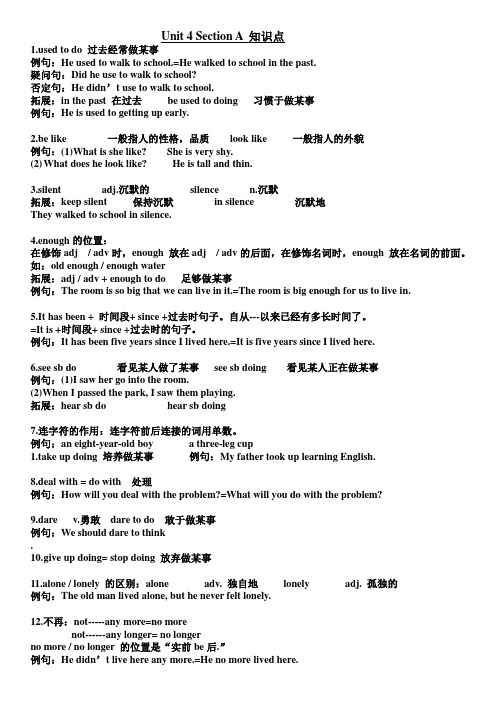
Unit 4 Section A 知识点ed to do 过去经常做某事例句:He used to walk to school.=He walked to school in the past.疑问句:Did he use to walk to school?否定句:He didn’t use to walk to school.拓展:in the past 在过去be used to doing 习惯于做某事例句:He is used to getting up early.2.be like 一般指人的性格,品质look like 一般指人的外貌例句:(1)What is she like? She is very shy.(2)What does he look like? He is tall and thin.3.silent adj.沉默的silence n.沉默拓展:keep silent 保持沉默in silence 沉默地They walked to school in silence.4.enough的位置:在修饰adj / adv时,enough 放在adj / adv的后面,在修饰名词时,enough 放在名词的前面。
如:old enough / enough water拓展:adj / adv + enough to do 足够做某事例句:The room is so big that we can live in it.=The room is big enough for us to live in.5.It has been + 时间段+ since +过去时句子。
自从---以来已经有多长时间了。
=It is +时间段+ since +过去时的句子。
例句:It has been five years since I lived here.=It is five years since I lived here.6.see sb do 看见某人做了某事see sb doing 看见某人正在做某事例句:(1)I saw her go into the room.(2)When I passed the park, I saw them playing.拓展:hear sb do hear sb doing7.连字符的作用:连字符前后连接的词用单数。
九年级上册英语第四课时答案
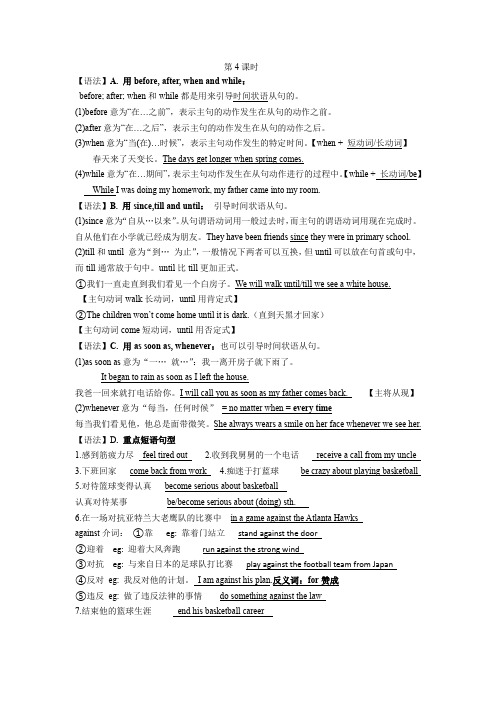
第4课时【语法】A. 用before, after, when and while:before; after; when和while都是用来引导时间状语从句的。
(1)before意为“在…之前”,表示主句的动作发生在从句的动作之前。
(2)after意为“在…之后”,表示主句的动作发生在从句的动作之后。
(3)when意为“当(在)…时候”,表示主句动作发生的特定时间。
【when + 短动词/长动词】春天来了天变长。
The days get longer when spring comes.(4)while意为“在…期间”,表示主句动作发生在从句动作进行的过程中。
【while + 长动词/be】While I was doing my homework, my father came into my room.【语法】B. 用since,till and until:引导时间状语从句。
(1)since意为“自从…以来”。
从句谓语动词用一般过去时,而主句的谓语动词用现在完成时。
自从他们在小学就已经成为朋友。
They have been friends since they were in primary school. (2)till和until 意为“到…为止”,一般情况下两者可以互换,但until可以放在句首或句中,而till通常放于句中。
until比till更加正式。
①我们一直走直到我们看见一个白房子。
We will walk until/till we see a white house.【主句动词walk长动词,until用肯定式】②The children won’t come home until it is dark.(直到天黑才回家)【主句动词come短动词,until用否定式】【语法】C. 用as soon as, whenever:也可以引导时间状语从句。
(1)as soon as意为“一…就…”:我一离开房子就下雨了。
- 1、下载文档前请自行甄别文档内容的完整性,平台不提供额外的编辑、内容补充、找答案等附加服务。
- 2、"仅部分预览"的文档,不可在线预览部分如存在完整性等问题,可反馈申请退款(可完整预览的文档不适用该条件!)。
- 3、如文档侵犯您的权益,请联系客服反馈,我们会尽快为您处理(人工客服工作时间:9:00-18:30)。
九年级英语上册第四课知识点整理
九年级英语上册第四课知识点整理
I.Words
1.recognizev.recognizableadj.recognitionn.
ThebuildingwaseasilyrecognizedasShanghaiuseu.
2.tiny:averysallinsizeandaount
3.beaware(unaware)ofawarenessunawarenessindnesscarefulnesssadness
happiness
aware:noworrealizesoething
4.dependv.independentadj.dependentadj.dependencen.i ndependencen.
Don’tdependonsoehelpfroothers.
youcan’tbedependentonyourparentsallyourlife. dependon:relyon
5.coon:happeningoften
acoonEnglishnaeincoon
janeisybestfriendbecausewehavesoethingincoon.
6.nowv.nowledgen.benownasunnownadj.anunnownreason/i
nsect
7.rarely:notveryoftenrareadj.(近)seldo表否定 Itisraretosnowheavilyinthisseason.
Wecouldrarelyagreewitheachother.
Thefaousactorisrarelyseeninpublicnowadays.
8.printv.printern.
9.iportantadj.iportantlyadv.iportancen.
oneyplaysaniportantroleinourdailylife.
Itisiportantforhitoattendtheeeting.
oreiportantly,wehavegottheevidence.
Shetoldustheiportanceofsafety.
10.operate:runoperateonoperation
Soepeoplecanonlyoperatewellunderpressure.
Hewasseriouslyinjuredandneededtobeoperatedoniediate ly.
Hisoperationwassuccessful.
11.forthetiebeing:atpresent
12.eanv.eaningn.eaningfuladj.eaningless.Adj.
13.coand:order
14.writev.writingn.writern.
15.orderv.n.命令,预订,次序outoforder
16.eep/losecontactwith
17.referv.referencen.areferenceboo
younowwhoIareferringto.
18.quantity:anaountoranuberofsoething
inlargequantitieshugequantitiesof
19.longadj.lengthn.strongadjstrengthn.highadj.heigh tn.
weighv.weightn.
20.sitv.seatn.seatbelt
21.pea:thepointedtopofaountainpeaofone’scareer
22.tenniscourtthecourtroo
23.distantadj.distancen.theaountofspacebetweentwopl acesorthings
eepdistanceadistanteoryabout10distant
II.Text
1.coputershavebecoesallerandsallersincethen.
Wehavebeenfriendseversinceweleftschool.
It’salongtiesinceIetyou.
Since/for
2.Theyaresallenoughtoputin.Theyaresosallthatyoucan ….
…sotinythatyouaybeunawareof….
…tinyenoughtobeunawareof…
…tootinytobeawareof….
3barabarofchocolatesnacbarwindowswithbars
4.other/what/any/differentindsof
5.Itiscoonnowledgethatpandasareournationaltreasures .Asweallnow
6.作文常用语:what’sore,oreiportantly,inaddition,furtherore,besides
7.forthesereasons:becauseofthesereasons.
1)比较Hetooataxi,foritrainedheavily.
jennydidn’tgotoschoolbecauseshewasill.
Becauseyfatherwasbusy,wedidn’tgoforaholidaylastsuer.位置
2)why---because
3)Heworshard,notbecauseheneedsoney,butbecausehelies helpingothers.
4)for语气比较弱,非直接原因,众所周知的原因
because肯定直接原因
aryustbeill,forshedidn’tgotoschooltoday.
Ididn’tgotoschoolbecauseIgotabadcold.
8.electricityn.electricfans/heaterselectricalproduc ts/probles/appliances/boos
Electronicwatch/ail
9.theanswertothisquestions,theeytothedoor,theticets fortheshow,theentrancetothebuilding
10.bebetterthandoctors,bebetteratdoingtheirjobs =bebetteratdoingtheirjobsthandoctors
11.need/want/proise/enable/allow/encouragetodo
12.youcantaltothecoputeranditwillobeyyourcoands 注意时态
Pleasevisitourcountryandyouwillloveit.
edto,beusedtodo,beusedtodoinguse…to/for 14read,readabout,learn,learnabout
15.复习定语从句
ostthingsthatahuanbraincando
aprograwhichhelpscoputerrecognizeyourvoice。
